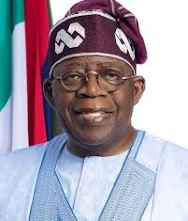
News Commentary: The Dialectics of Tinubu’s Renewed Hope and Emilokan Concept: One Year after
![]()
News Commentary:
The Dialectics of Tinubu’s Renewed Hope and Emilokan Concept: One Year after

President Bola Ahmed Tinubu
By Frank Odinukaeze
In the vibrant tapestry of Nigeria’s political landscape, the emergence of President Bola Ahmed Tinubu’s administration has been marked by a distinctive narrative of ‘Renewed Hope’ and the resonant ‘Emilokan’ concept. As the nation navigates through the complexities of governance and development, these two themes have become emblematic of Tinubu’s vision for Nigeria.
Riding on the thrust of Renewed Hope,as a vision for sustainable development,
President Tinubu’s ascension to the presidency on May 29, 2023, was a watershed moment for Nigeria. With a bold inaugural declaration that signaled the end of fuel subsidies, Tinubu set the tone for an administration poised to tackle Nigeria’s multifaceted challenges. The ‘Renewed Hope’ agenda, a cornerstone of his campaign, encapsulates a commitment to revitalizing Nigeria’s economy, enhancing security, and improving governance.
In the first year of his presidency, Tinubu has initiated essential reforms aimed at stabilizing the economy and fostering sustainable growth, even though these bold reforms have had their draw backs.The removal of fuel subsidy and the unification of the exchange rate are testament to his resolve to address economic distortions and restore investor confidence.
The ‘Emilokan’ slogan, translating to “it’s my turn” in Yoruba, has transcended its linguistic origins to become a symbol of Tinubu’s empathetic leadership style. It reflects a deep understanding of the aspirations and struggles of the Nigerian people.
By adopting this slogan, Tinubu has positioned himself as a leader attuned to the daily lives of ordinary Nigerians, fostering a sense of trust and hope among the electorate.
The slogan’s grassroots appeal and its inclusive message have played a pivotal role in mobilizing support across the nation’s diverse ethnic and cultural identities. It underscores Tinubu’s commitment to unity, inclusivity, and a shared sense of purpose,and unquenchable desire to improve the socio political narrative of the nation.
The Interplay of Hope and Determination are pivotal to Tinubu’s dialectical approach to Nigeria’s socio economic challenges.
Dialectics, or a dialectic, refers to a form of logical argumentation involving the progression of two opposing views, and a related philosophical concept of ideological evolution. This process can also be called the dialectical method.,as espoused by Kierkegaard, Karl Marx,Hegel,et.al.
President Tinubu has consistently and persistently adopted the dialectical approach in solving Nigeria’s multifaceted challenges.
Indeed,the dialectical relationship between ‘Renewed Hope’ and the ‘Emilokan’ concept is a reflection of Tinubu’s strategic approach to governance. While ‘Renewed Hope’ outlines the administration’s blueprint for progress, ‘Emilokan’ serves as a rallying cry for inclusive development and participatory governance: Everyone being involved!
As Nigeria marks one-year of Tinubu’s presidency, it is an opportune time to reflect on the impact of these guiding principles. The journey ahead is fraught with challenges, but with a steadfast commitment to these ideals, the Tinubu administration aims to steer Nigeria towards a future of prosperity and unity.
In conclusion, the dialectics of Tinubu’s ‘Renewed Hope’ and ‘Emilokan’ concept offer a nuanced understanding of his presidency’s aspirations. It is a narrative of transformation, where hope is not just a promise but a call to action, and ‘Emilokan’ is not merely a slogan but a testament to the power of empathy and empowerment in Nigerian politics.
As the train of Renewed Hope and “Emilokan” surges forward,it is hoped that the ideological basis of these concepts would eventually materialise to the Nigeria of our dreams,where ‘Renewed Hope’ is not just an illusion,but a reality.









